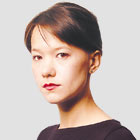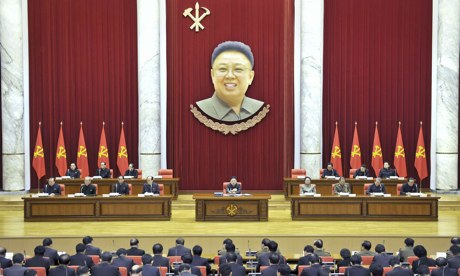
http://www.rfa.org/english/commentaries/purged-01062014151151.htmlNorth Korean leader Kim Jong Un delivers his New Year's Day address in Pyongyang, hailing the execution of his once-powerful uncle as a resolute act to remove "factionalist scum."
The purge of Jang Song Thaek has brought about many changes in North Korea. One of these changes has been the disappearance of news articles from North Korea’s state media websites concerning Jang. North Koreans are in the dark about this, but KCNA and Rodong Shinmun post articles on their websites that can be seen by anyone abroad.
These articles include those that were published recently, but also ones that were uploaded years ago. It is from these articles that the North Korean authorities have deleted any references to Jang.
They have also removed pictures with Jang’s face, and have edited out scenes from videos where Jang appeared.
A similar thing happened to Lee Young Ho after he was purged last summer. Lee was the most powerful man in the North Korean military before being purged. Soon after he was removed from his position in July 2012, any mention of him was deleted from the North Korean media and history textbooks.
Lee had stood in the first line with Kim Jong Un during Kim Jong Il’s funeral, but now even this photo cannot be seen anymore in North Korea.
This history of purging is a unique characteristic of the country and has led the world to believe that history does not exist in a country like North Korea. North Korea’s leaders may remove or distort the country’s historical facts and truths at their own will.
Removed from view
That being said, there is no denying that Jang, Lee, and others like them—regardless of whether they were good or bad—played tremendously large roles in recent North Korean history.
Now, however, North Koreans are not even allowed to mention their names.
There are many forces in this world that aim to distort history. Political forces of every color and stripe tend to distort historical facts in order to suit their own interests or values. However, the act of distorting historical fact cannot mean refusing to acknowledge truths that are already well known by the people.
Moreover, all societies have political forces that are in competition with each other, so political forces that attempt historical distortion face criticism from other political forces. It is common for rightist scholars to attack leftist scholars, whether it be in Korea, Germany, or Russia.
In such countries it is impossible to completely distort historical fact. Even if, with the intent of removing certain facts from collective memory, historical facts are not reported, the other side emphasizes and spreads those facts regardless.
'Perfect control'
North Korea is in a completely different situation, however. North Korea has no conflicting political parties, and only a very small minority of the population has a complete hold on power. The leadership has perfect control over history.
North Korea’s supreme leader may remove all mention of Jang, Lee, and other purged party members, and can choose not to talk about important historical events. North Korean leaders are also free to concoct events that never really happened and spread them as historical fact.
I will give you one example here.
North Korea’s official propaganda machine argues that Kim Il Sung commanded the Chosun People’s Revolutionary Army (CPRA) in the 1930s. A look at records from the time, though, shows that there is no written evidence that this organization existed. Kim did fight against the Japanese but fought as an officer in the Chinese Communist Party’s armed forces.
But nationalism and the need to paint Kim as a heroic leader have led the North Koreans to ignore this fact and turn the existence of the CPRA into a historical fact.
This kind of shameless distortion of history is one reason why the outside world completely ignores the North Korean version of its own history.
Translated by Robert Lauler.
Andrei Lankov, a professor at Kookmin University in Seoul, is a Russian historian, North Korea expert, and regular RFA contributor.









